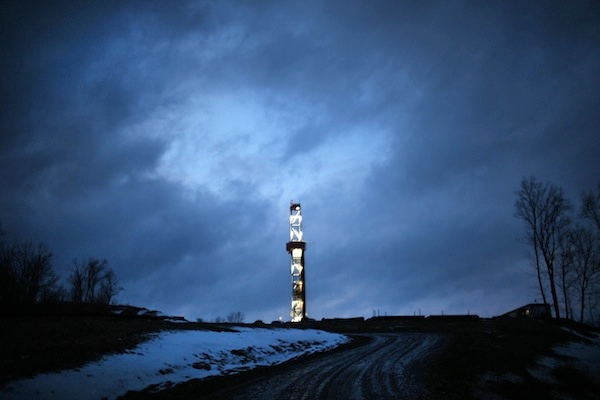David Howell never really succeeded as energy and then transport secretary in Mrs Thatcher’s governments. After she sacked him in 1983, Thatcher wrote that ‘he lacked the mixture of creative political imagination and practical drive to be a first-class cabinet minister’.
If she were still alive and writing now, she might have added that he has the sensibilities of a rhinoceros on Valium. His remark this week that fracking is more acceptable in the north-east because that part of the country is ‘desolate’ has rightly been condemned. No politician should go about insulting parts of his own country, least of all a part of the country that his party is widely thought to disdain.
Lord Howell’s comments add grist to the arguments of those who complain that the government only supports fracking when it is well outside Conservative constituencies. This is an impression which the government needs to correct very quickly by supporting the case for fracking in Sussex — where this week celebrity protestors have joined locals to oppose an exploratory test bore for oil and gas (not yet involving fracking) — every bit as much as it supports fracking in the Labour heartlands of Lancashire.
It will never be possible to win over the extremities of the nimby tendency. But by tackling the misinformation spewed out by groups claiming to speak on behalf of the environment, a large majority of Sussex residents, as well as those farther north, can be won over. Far from requiring a desolate, lightly inhabited landscape, fracking is quite capable of being carried out in intimate areas of countryside such as the Sussex Weald without ill effect. Fracking does naturally involve a certain amount of fracturing. But this is only required while establishing a well. Once this process in completed it is possible to extract gas for decades, quietly and cleanly.
The area of land required is small — about the size of two football pitches for a well pad. As for traffic, the 400 or so lorry movements required during the fracking process itself will be lost among the lorries daily negotiating the roads of Sussex to deliver white goods to rural homeowners and carry materials to and from construction sites.
Has any piece of propaganda been so persistent as the idea that fracking causes local residents’ water taps to emit a stream of flammable gas? Of several thousand fracking sites in the US just one — in Pennsylvania — has been implicated with causing the -contamination of drinking water with methane. But the contamination did not come from the fracking itself, which happens thousands of feet down; it came from the natural gas close to the surface which had been contaminating local residents’ water supplies for decades but which was slightly increased when a poorly constructed borehole for gas extraction was drilled through the upper layers of rock.
Britain cannot afford to reject fracking if it is to remain competitive with the US, which is pursuing a cheap energy policy while renewable energy targets are driving up the cost of energy here. Moreover, as has happened in the US, fracking offers the quickest way to reduce carbon emissions without condemning ourselves to a state of pre-industrial poverty. But our fracking industry will only succeed if public fears are first calmed through an open and frank debate of the risks and how they will be managed. Lord Howell’s foolish contribution does nothing to help win an argument which must, nevertheless, be won.
Iraq’s dangerous corner
A few months ago, foreign-policy hawks were fond of saying that Iraq had ‘turned a corner’.
Yes, they agreed, it had been a painful decade, but things were improving and before long everyone would have to admit that the country was better off than it was before. In March, Baroness Nicholson even wrote in these pages about the ‘rebirth of a nation’ in Mesopotamia. The country’s oil-rich economy had started to soar, she said, and a healthy democracy was taking root.
Nobody would say that now. Sunni-Shia hostilities are spilling over from the conflict in Syria and Iraq is a war zone once more. Last week, al-Qa’eda in Iraq raided a prison in Baghdad, releasing hundreds of convicted terrorists. Since then, unsurprisingly, bomb attacks in the capital have intensified. While the world turns a blind eye, almost 3,000 people have been killed in the last three months, and Prime Minister Nouri al-Maliki seems to be losing his grip.
There’s nothing the West can do to help — but that in itself is a salutary lesson. The horror of what has happened in Iraq should serve as a grim reminder not to claim success too quickly. Across the region, the fault line between the Sunnis and the Shia is always ready to break apart.






Comments